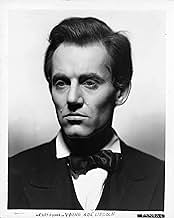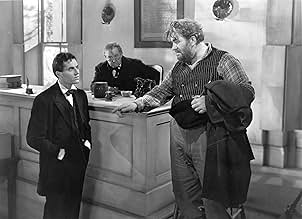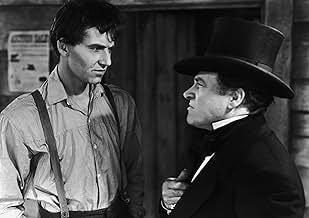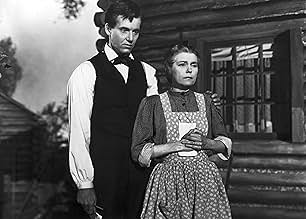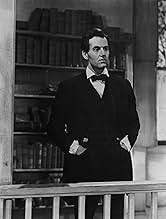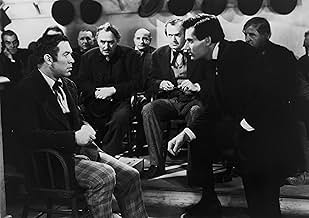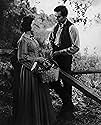अपनी भाषा में प्लॉट जोड़ेंA fictionalized account of the early life of the American president as a young lawyer facing his greatest court case.A fictionalized account of the early life of the American president as a young lawyer facing his greatest court case.A fictionalized account of the early life of the American president as a young lawyer facing his greatest court case.
- 1 ऑस्कर के लिए नामांकित
- 6 जीत और कुल 2 नामांकन
- Carrie Sue
- (सिर्फ़ क्रेडिट)
- Man with Lynch Mob
- (बिना क्रेडिट के)
- Townsman Dancing at Party
- (बिना क्रेडिट के)
- New Salem Townsman
- (बिना क्रेडिट के)
- Carrie Sue
- (बिना क्रेडिट के)
- Peach Pie Baker
- (बिना क्रेडिट के)
- Loafer
- (बिना क्रेडिट के)
फ़ीचर्ड समीक्षाएं
Patriototic motion picture that is one of my favorite films from John Ford. Henry Fonda is perfect in the role of the young Abraham Lincoln. In fact, he bears a little resemblence to the late admired and revered, Abraham Lincoln. Fonda gives a performance of admiring humaine tenderness. Many of the scenes in Young Mr Lincoln(1939) are done with beauty and finesse.
The film marked Ford's first of nine collaborations with Henry Fonda and is also a quintessential example of Ford's folksy Americana vein. A beautifully made and pictorially quite poetic piece of work, the courtroom sequences (and eventual revelation) in its second half still pack quite a wallop, apart from giving stalwart character actor Donald Meek a memorably meaty role as the prosecuting attorney.
Fonda is, of course, perfectly cast as a bashful, inexperienced but rigorous and humanistic lawyer who was destined to become President; Fonda would go on to portray other fictitious politicians on film - most notably in Franklin J. Schaffner's THE BEST MAN (1964) and Sidney Lumet's FAIL-SAFE (1964) - and it's surprising now to learn that he was reluctant at the time about accepting the role of Lincoln since, in his view, that was "like playing God"!
It is interesting to note here that Ford had previously tackled Abraham Lincoln (tangentially) in THE PRISONER OF SHARK ISLAND (1936), a superb but perhaps little-known gem which has, luckily, just been released as a Special Edition DVD by the UK's veritable Criterion stand-in, Eureka's "Masters Of Cinema" label. Besides, I also have two more Abraham Lincoln films in my DVD collection which I've yet to watch and, incidentally, both were directed by D. W. Griffith - THE BIRTH OF A NATION (1915) and ABRAHAM LINCOLN (1930) - and, had I not just received a bunch of films I've never watched before just now, I would have gladly given them a spin based on my highly-satisfying viewing experience with YOUNG MR. LINCOLN.
John Ford before the shooting starts put him at ease by saying he wasn't going to be playing the Great Emancipator, but just a jack-leg prairie lawyer. That being settled Fonda headed a cast that John Ford directed into a classic film.
This is not a biographical film of Lincoln. That had come before in the sound era with Walter Huston and a year after Young Mr. Lincoln, Raymond Massey did the Pulitzer Prize winning play by Robert Sherwood Abe Lincoln in Illinois. Massey still remains the definitive Lincoln.
But as Ford said, Fonda wasn't playing the Great Emancipator just a small town lawyer in Illinois. The film encompasses about 10 years of Lincoln's early life. We see him clerking in a general store, getting some law books from an immigrant pioneer family whose path he would cross again later in the story. And his romance with Ann Rutledge with her early death leaving Lincoln a most melancholy being.
Fast forward about 10 years and Lincoln is now a practicing attorney beginning to get some notice. He's served a couple of terms in the legislature, but he's back in private practice not really sure if politics is for him.
This is where the bulk of the action takes place. The two sons of that family he'd gotten the law books from way back when are accused of murder. He offers to defend them. And not an ordinary murder but one of a deputy sheriff.
The trial itself is fiction, but the gambit used in the defense of Richard Cromwell and Eddie Quillan who played the two sons is based on a real case Lincoln defended. I'll say no more.
Other than the performances, the great strength of Young Mr. Lincoln is the way John Ford captures the mood and atmosphere and setting of a small Illinois prairie town in a Fourth of July celebration. It's almost like you're watching a newsreel. And it was the mood of the country itself, young, vibrant and growing.
Fans of John Ford films will recognize two musical themes here that were repeated in later films. During the romantic interlude at the beginning with Fonda and Pauline Moore who played Ann Rutledge the music in the background is the same theme used in The Man Who Shot Liberty Valance for Vera Miles. And at a dance, the tune Lovely Susan Brown that Fonda and Marjorie Weaver who plays Mary Todd is the same one Fonda danced with Cathy Downs to, in My Darling Clementine at the dance for the raising of a church in Tombstone.
Lincoln will forever be a favorite subject of biographers and dramatists because of two reasons, I believe. The first is he's the living embodiment of our own American mythology about people rising from the very bottom to the pinnacle of power through their own efforts. In fact Young Mr. Lincoln very graphically shows the background Lincoln came from. And secondly the fact that he was our president during the greatest crisis in American history and that he made a singularly good and moral decision to free slaves during the Civil War, albeit for some necessary political reasons. His assassination assured his place in history.
Besides Fonda and others I've mentioned special praise should also go to Fred Kohler, Jr. and Ward Bond, the two town louts, Kohler being the murder victim and Bond the chief accuser. Also Donald Meek as the prosecuting attorney and Alice Brady in what turned out to be her last film as the pioneer mother of Cromwell and Quillan. And a very nice performance by Spencer Charters who specialized in rustic characters as the judge.
For a film that captures the drama and romance of the time it's set in, you can't do better than Young Mr. Lincoln.
क्या आपको पता है
- ट्रिवियाJohn Ford and producer Darryl F. Zanuck fought an extended battle over control of the film. Ford even had unused takes of the film destroyed so the studio could not insert them into the movie. One scene that Ford insisted on cutting was a scene where Lincoln met his future assassin, a very young John Wilkes Booth.
- गूफ़Lincoln is shown playing "Dixie" on a Jew's harp. That portion of the film is ostensibly set in the year 1837, but most reliable sources indicate that "Dixie" wasn't written, publicly performed nor published before 1859. During the Civil War, Lincoln was known to be partial to the tune (it was almost as popular in the North in the 1860s as in the South), but it's unlikely he would have heard it in the 1830s.
- भाव
Abe Lincoln: [cross-examining Cass] J. Palmer Cass.
John Palmer Cass: Yes, sir.
Abe Lincoln: What's the "J" stand for?
John Palmer Cass: John.
Abe Lincoln: Anyone ever call you Jack?
John Palmer Cass: Yeah, but...
Abe Lincoln: Why "J. Palmer Cass?" Why not "John P. Cass?"
John Palmer Cass: Well, I...
Abe Lincoln: Does "J. Palmer Cass" have something to hide?
John Palmer Cass: No.
Abe Lincoln: Then what do you part your name in the middle for?
John Palmer Cass: I got a right to call myself anything I want as long as it's my own name!
Abe Lincoln: Well then if it's all the same to you, I'll call you Jack-cass.
[Roar of laughter from spectators]
- कनेक्शनFeatured in The Blue Bird (1940)
- साउंडट्रैकThe Battle Cry of Freedom
(1862) (uncredited)
Written by George Frederick Root
Played during the opening credits and sung by an unidentified chorus
टॉप पसंद
विवरण
- रिलीज़ की तारीख़
- कंट्री ऑफ़ ओरिजिन
- भाषा
- इस रूप में भी जाना जाता है
- Mladost prezidenta Lincolna
- फ़िल्माने की जगहें
- सैक्रामेंटो, कैलिफोर्निया, संयुक्त राज्य अमेरिका(river scenes)
- उत्पादन कंपनियां
- IMDbPro पर और कंपनी क्रेडिट देखें
बॉक्स ऑफ़िस
- बजट
- $15,00,000(अनुमानित)
- चलने की अवधि1 घंटा 40 मिनट
- रंग
- पक्ष अनुपात
- 1.37 : 1

